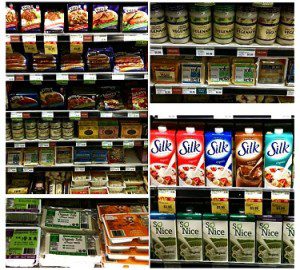

Somehow soy received it’s designation as a healthy food but for several reasons it is far from it. Because it is thought of as a healthy alternative to many other foods, grocery shelves are heavily stocked with every possible type of soy product imaginable.
Why avoid soy products?
For starters, the majority of soy grown in the U.S. is genetically modified. It’s modified so that it can survive herbicides, mainly Monsanto’s Roundup which is sprayed over entire crops of soybeans. Roundup kills just about everything around it except the soybean crop that has been genetically modified to withstand the herbicide. There are many concerns about what the final product does to our health and it’s easy enough to read about them by doing a simple search of health concerns due to ingesting genetically modified foods.
Aside from concerns about soy being genetically modified, soy itself, even if grown organically, can be problematic to one’s health. Soy is high in phytic acid which prevents the absorption of minerals such as calcium, magnesium, iron and zinc. These are important minerals needed in the body. Soy has also been found to contribute to thyroid dysfunction in women in the U.S. If the news isn’t bad enough, soy is also high in omega-6 fatty acid which is already overly abundant in the American diet due to food processing.
What really troubles me is that most infant formulas are soy based. To know that infants are practically living on soy is disturbing. Much more is written about soy and is easy enough to find online from trusted sources. One of my earliest warnings about soy came from Walter Willett, Chair of the department of Nutrition at Harvard who warned about the dark side of soy in one of his book titled, Eat, Drink and Be Healthy. Much has been written since as well.
If you must eat soy products or use soy in recipes a suggestion is to make sure it is grown organically to avoid the perils of genetically modified food AND use it sparingly. Fermented soy is a better option yet int he form of natto or tempeh. Miso (also a fermented soy product) has an extremely high salt content.
For just $5.oo,, you can own a guide to starting your child on the healthiest path possible. This guide includes Infant and toddler recipes based on the world-famous Mediterranean Diet. It includes over 30 recipes and all the information you need to help your child live the healthiest life.